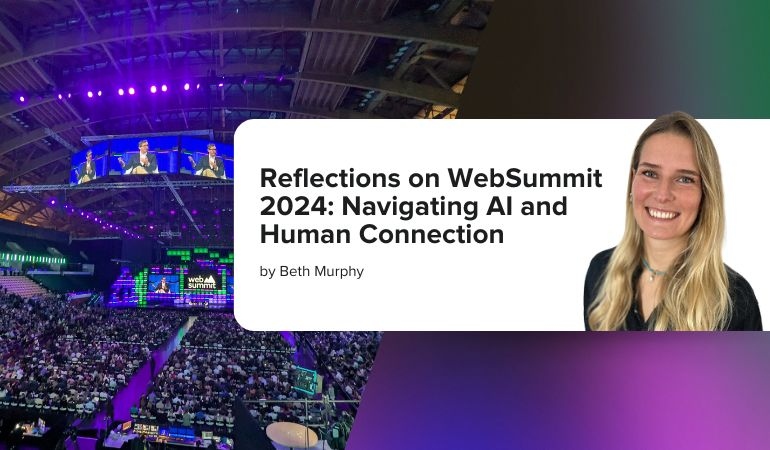Last week, 70,000 techies from around the world gathered in a cool, sunny Lisbon for WebSummit 2024. The overarching ‘hot-topic’ this year was unanimous: AI. Thousands of new tech start-ups showcasing AI-based USPs were exhibiting, and the majority of speakers and panels had an AI focus.
My goal was to learn more about leveraging AI, gain valuable insights from an incredible, jam-packed schedule of talks, and meet others working in the digital space.
Here are my key takeouts:
AI: The hype, the fatigue and the uncertainty
I had anticipated hearing some decisive projections from industry leaders on AI’s trajectory and its future impact on the job market, innovations, and the wider world, and while there were a plethora of incredibly insightful panels and discussions, it seems that what comes next and how AI will shape our futures isn’t entirely clear yet.
We are at a critical yet uncertain moment in time when it comes to understanding AI’s potential impacts on our day-to-day lives. Advances in AI are already transforming key areas like natural language processing, education, administration, and medical diagnostics. But after the initial excitement around AI in recent years, many attendees I spoke to, expressed AI-related fatigue and concern over the broader implications that still lie ahead.
Key takeout: People are getting tired of AI for the sake of AI. While its potential is undeniable, transforming industries from healthcare to education, the kind of future it promises remains unclear.
The connectivity paradox
Lidiane Jones, CEO of Bumble, highlighted the growing irony that despite being more digitally connected than ever, many of us feel profoundly disconnected. Her session, ‘Connected in a Disconnected World: Tech’s Role in Tackling Loneliness’, was a really interesting talking point, triggering conversations about the mental health implications of constant online interactions and the need for tech that fosters genuine human connections.
This discussion resonated deeply, drawing a huge audience, with hundreds standing at the back to listen in. People from all backgrounds and professions are seeking meaningful connections in all aspects of life, beyond metrics and algorithms.
Key takeout: We’ve never been more connected, yet we’ve never felt more alone. Digital tools designed to bring us together often amplify our feelings of isolation - the challenge is learning how to use these tools to maximise our sense of community and foster real-life connections that give us purpose and joy.
Navigating AI’s challenges: Skillsets and survival
A recurring question everyone was asking: ‘is my job going to be at risk?’. The response from this year’s speakers was that AI should ‘improve, not replace’.
There was a tangible sense of urgency about adapting to AI’s rapid advancements and the fear of being left behind. Business leaders emphasised that adaptability and continuous learning are no longer optional - they’re essential for career longevity and innovation.
Despite AI’s transformative capabilities, its limitations were also highlighted. Vidya Peters, CEO at DataSniper, delivered a talk on ‘How to Stay Relevant in an AI Age’, which explored AI’s impact across various sectors. She highlighted that AI, while revolutionary, lacks the nuance, empathy, and emotional depth that define human nature and our interactions. This offered a glimmer of reassurance for those concerned about their career prospects. It seems our human complexities still give us a competitive edge over AI’s current capabilities (for now).
Key takeout: Many were still left wondering: Will AI empower or erase the workforce? The resounding message was that we should be using AI to automate anything mundane or repetitive and focus our time on things that really add value.
Generational Concerns
A slightly more difficult topic that was covered is how different generations think, work, strategise and adapt to AI. It seems that AI is both broadening and bridging the gap between how younger and older generations work, socialise, find love, and even eat. The questions posed were: How will an ageing population cope with and leverage these rapid advancements? Are younger generations losing the ability to think and work independently, having grown up with pervasive technology?
Key takeout: As human augmentation accelerates, the challenge isn’t just bridging the generational divide, but ensuring that innovation uplifts everyone, rather than alienating sections of our society.
Thoughts
WebSummit 2024 was a blend of excitement and uncertainty in the face of AI’s domination both at work and at home, and although incredibly interesting, for me, the talks raised as many questions as they answered.
While AI will undoubtedly shape the future, our collective challenge is to navigate its integration thoughtfully and leverage the advantages of what makes us uniquely human: our empathy, and our need for connection, purpose, and community.





